Are you too late for podcasting?
Does everyone and their mother have one, or is it like crypto where there's still a lot of development ahead.
Past the podcasting winter and trough of disillusionment, the industry is starting to get even more serious. HubSpot has built out a podcasting network and started buying up other podcasts.
There's real money that can be had for top pods in the business world, especially.
But getting it off the ground requires infrastructure: podcast hosting.
Developing a podcast that can attract an audience is an exciting opportunity for many folks. Based on data from Statista, it is estimated that podcasts in the U.S. will attract about 164 million monthly listeners by 2024.
Although podcasts aren't as bandwidth-heavy as some options for building an audience, they still require the ability to deal with many concurrent streaming connections on a wide range of devices. That makes suitable podcast hosting an essential part of any growth strategy.
You'd be right to wonder what the best podcast hosting platforms might be and where to upload podcasts. In this review, we'll look at 15 podcast hosting choices. They'll be broken up into paid and free podcast hosting companies.
Podcasting Basics
Before we jump into the reviews, though, let's cover some of the basics of podcasting. A podcast is an audio stream that usually features a spoken-word format, and it may also include interviews. People do podcasts related to all kinds of topics, ranging from the latest dirt from Silicon Valley to digging the dirt in a backyard garden.
Very few people have the resources to build out their podcast hosting sites. Likewise, it's rarely worth it to reinvent the wheel even if you have the skills and resources required to do DIY podcast hosting.
Most podcasts come in one of two forms. Live streams send media to a remote server that then relays the stream to the audience's preferred players. Conversely, many folks prefer to upload podcasts after they've done extensive production work. The files are then available for audience members to stream or download to their devices. Depending on the nature of the service, users might access the podcast for free or have to pay a fee.
A Note About Podcast Directories
You'll hear many mentions on websites, broadcasts and social media feeds to check for a podcast somewhere like iTunes or Google Play Store. These are almost always directories of podcasts. To actually allow streaming or downloads, you need to have a host. When researching where to upload podcasts, make sure to determine whether you're dealing with a hosting provider or a directory.
What to Look for in Podcast Hosting Sites
If you've gotten to the point where you're exploring the best podcast hosting platforms, you should have a basic idea of what hosting features are required for anything on the web. The basic requirements to be the best at hosting tend to include things like:
- Proven reliability
- Social media sharing and marketing options
- Email collection and marketing tools
- Analytics packages and dashboards that allow you to monitor audience interest and growth
- Unlimited or high bandwidth quotas
- Significant amounts of file storage
- 24/7 tech and customer support
Unsurprisingly, there are some requirements that are unique to podcasting. These include:
- An RSS feed listing your uploaded audio files
- Hosting of downloadable MP3s
- Compliance with widely used streaming protocols on all major devices
- Monetization options
You also should look for some nice add-ins when you're paying for podcast hosting. For example, getting a free website and domain name is a wonderful little sweetener. Email addresses and relays are even better. Don't be afraid to shop until you find the host that delivers everything you want.
The Best Paid Podcast Hosting Providers
Our list of the best paid options includes:
- 1. PodBean
- 2. Transistor
- 3. Podcast Websites
- 4. Fusebox
- 5. Captivate
- 6. Spreaker
- 7. Audioboom
- 8. Castos
You are trying to load a table of an unknown type. Probably you did not activate the addon which is required to use this table type.
1. PodBean
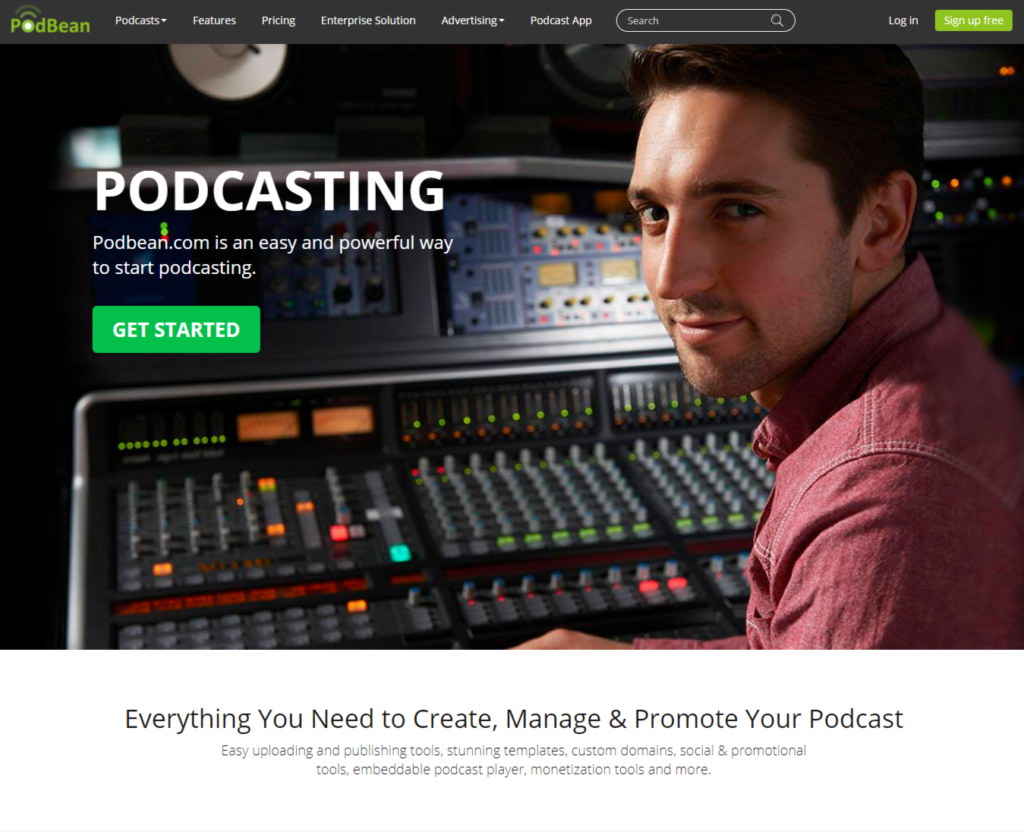
Pricing: $9 to $99 per month, and a free tier is available
Notable features:
- Unlimited storage
- Unmetered bandwidth
- Ad marketplace
- App for iPhone and Android
- Embeddable player for websites
The unquestioned main benefit of PodBean is the platform's commitment to providing unlimited everything on all paid plans. You'll see in later items in this list that many companies offer plans that have limits on how many hours of recorded content or how much bandwidth you can use each month. especially if you're planning on churching out daily or even long weekly podcasts, PodBean is an excellent option. The same goes for folks who want to do serialized podcasts that are supposed to be bingeable.
Free accounts are available. Unsurprisingly, the free accounts don't get the unlimited metering than paid ones do. The low-end $9-per-month accounts are sufficient for most audio podcasting needs. The next two tiers up the scale include features like video podcasting. Monetization is also very easy.
PodBean probably isn't the best option for beginners, especially because customer and tech support can be lacking. On the other hand, experienced folks who know they're going to need unlimited everything may see the somewhat high-price top-tier options as a very good value if they can produce content in sufficient volumes.
| Plan | Price | Storage Space | Bandwidth | iPhone/Android App |
| Basic | $0.00 | 5 hours | 100GB | Included |
| Unlimited Audio | $9.00 | Unlimited | Unmetered | Included |
| Unlimited Plus | $29.00 | Unlimited | Unmetered | Included |
| Business | $99.00 | Unlimited | Unmetered | Included |
2. Transistor
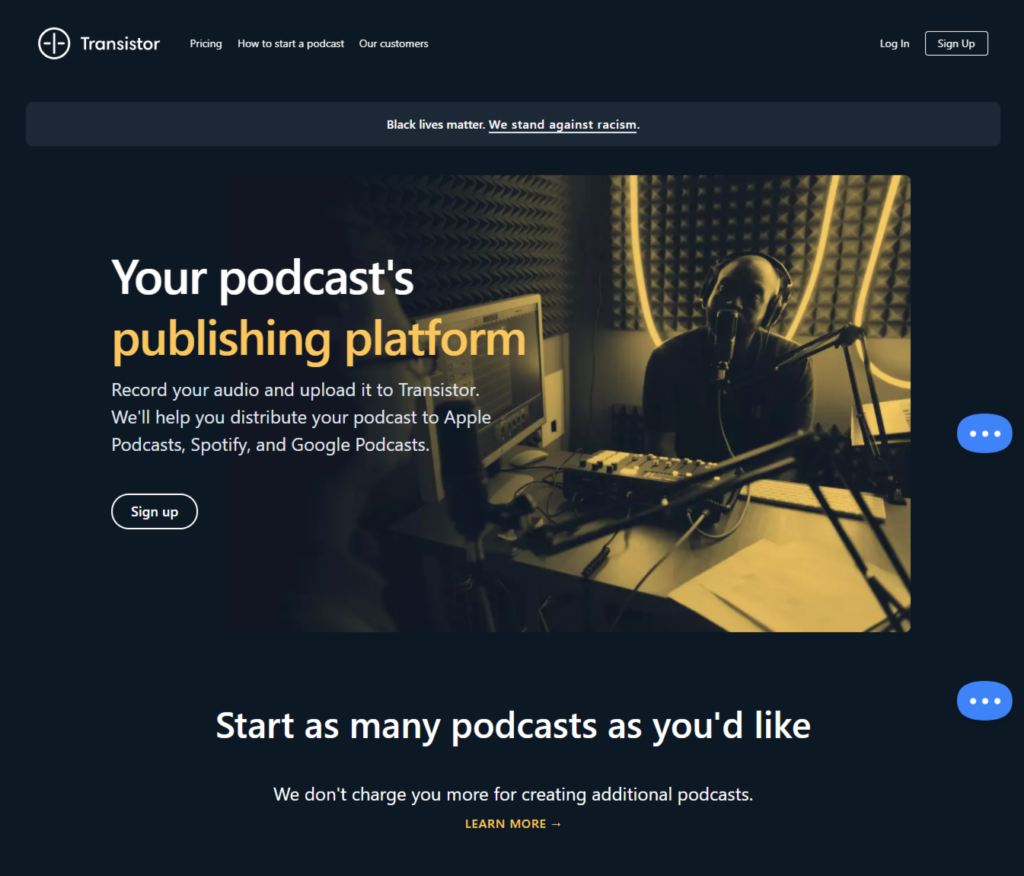
Pricing: $19 to $99 per month, and a free, 14-day trial is available
Notable features:
- Connects with Spotify, Apple Podcasts and Google Podcasts
- Private subscriber system
The branding tools are what make Transistor appealing, although these are only available for the top two of the three tiers. It's easy to connect your domain name and site to the podcast, and additional account users can be set up to manage podcasts, too.
The low-end pricing isn't great, but the business-tier plans are priced competitively near the average for the podcast hosting sites. One of the serious cons of Transistor, though, is that the company is thick with limits on featured that are tied to tiered pricing. If you want more than 10,000 downloads allowed per month, for example, you'll need to move to a more expensive plan.
Transistor's emphasis on private podcasting options is also very interesting. For the second and third tiers, these allow 500 and 1,000 private subscribers respectively per podcast. If you're planning to build around a subscriber model, this could be a very intriguing way to go.
| Plan | Monthly Price | Yearly Price | Subscribers | Downloads |
| Starter | $19 /mo | $190 /yr | 50 | 20,000 |
| Professional | $49 /mo | $490 /yr | 500 | 100,000 |
| Business | $99 /mo | $990 /yr | 3000 | 250,000 |
3. Podcast Websites
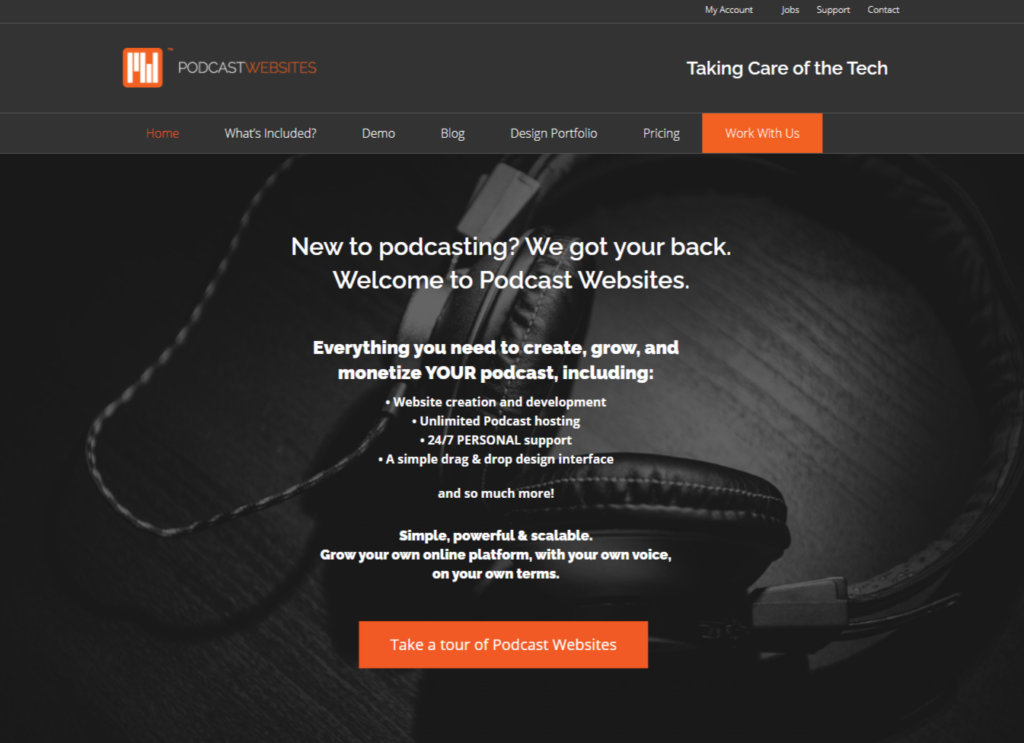
Pricing: $77 to $97 per month, and a free, 7-day trial is available, too
Notable features:
- Automatic publishing to iTunes, Google Play and Stitcher
- Free migration assistance
- Unlimited website pages
- Unmetered storage and bandwidth
- 24/7 support
- Built-in site and podcast file backup
What sets Podcast Websites apart is the company's commitment to hosting more than just podcasts. Yes, that sounds a bit goofy, but the company offers an excellent website development package that includes a drag-and-drop design system. Especially if you're trying to establish a site alongside a podcast, this can provide an excellent value proposition.
The pricing isn't great for beginners and dabblers, though. On the flip side, you get pretty much all the features you require for one price, although there are a few charges for add-on features like additional RSS feeds.
Podcast Websites also offers simple integration with many email marketing tools like MailChimp and Click Funnels. If you're developing a robust marketing campaign and a podcast at the same time, you'll want to give Podcast Websites a longer look than some others.
| Plan/Price | Visits | Themes | Podcast Episodes | Website Pages |
| $97/month | Unlimited | Included | Unlimited | Unlimited |
| $77/month | Unlimited | Included | Unlimited | Unlimited |
4. Fusebox
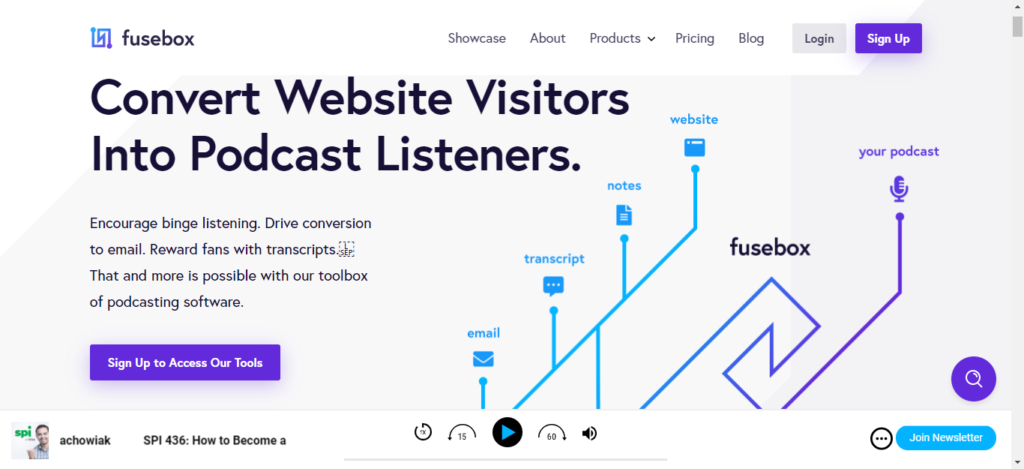
Pricing: $8 per month, and a free version is available, also
Notable features:
- WordPress plug-in integration
- Email capture
- In-player speed controls
- Social sharing features
- Live text transcription
- Downloadable PDF transcripts
Fusebox isn't quite the same breed of cat as some of the other podcast hosting sites. The company's focus is on providing a WordPress plug-in that allows you to integrate your podcasts into your website. They still provide hosting and downloadable MP3s, but this approach means you can create a more seamless integration of your branded materials and your podcast. That's an especially big deal for anyone who has a lot tied up in an existing WordPress website.
The speed control feature is something that will appeal to end-users more than podcasters. This is a system that allows them to listen to a podcast at, for example, 125% of the normal speed. Listeners still get to hear everything, but a 40-minute podcast will be done in 30 minutes instead.
Transcription is another big plus for Fusebox. While other sites either don't offer it or included it for an additional fee, Fusebox includes it with your baseline price.
A big downside, though, is that Fusebox isn't big on live customer support. Support is handled solely through e-mail, and that can be a pain when you need to address problems right now.
| Plan | Price | Visits | Player | Transcripts |
| Fusebox Free | Free | 10,000 | Single track | WP plugin with manual upload |
| Fusebox Pro | $15.83/mo | 100,000 | Single track, archive player, full page player, sticky player | Transcript plugin for WordPress with integration support for Rev and Temi |
5. Captivate
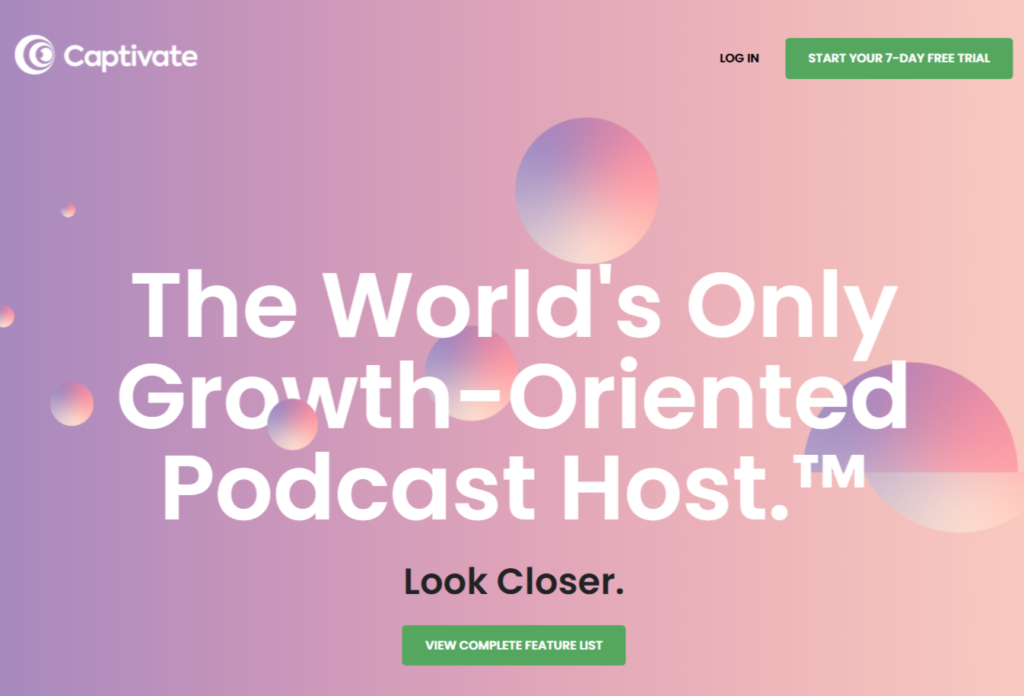
Pricing: $19 to $99 per month, and a free, 7-day trial is available
Notable features:
- All-included pricing
- Marketer-focused setup
- Unlimited team members
- Automatic podcast website
Captivate is billed as a podcasting host for marketers. You'll get access to loads of analytics, and you can also utilize lead-generation and email tools to provide calls to action. If you're interested in building a subscriber list for a cause or as part of a larger marketing strategy, Captivate may be an interesting way to go.
Pricing isn't especially beginner-friendly. The highest tiers, though, are in line with the industry-standard prices. Download totals are limited, with 120,000 per month permitted on the highest tier. Unless you're especially married to the marketing options, Captivate is probably a little too much of a middle-of-the-road option for anyone to get too excited about.
| Plan | Monthly Price | Annual Price | Downloads | Private Subscribers |
| Personal | $19.00 | $204.00 | 12,000 | 150 |
| Professional | $49.00 | $528.00 | 60,000 | 1,000 |
| Business | $99.00 | $1,080.00 | 150,000 | 5,000 |
6. Spreaker
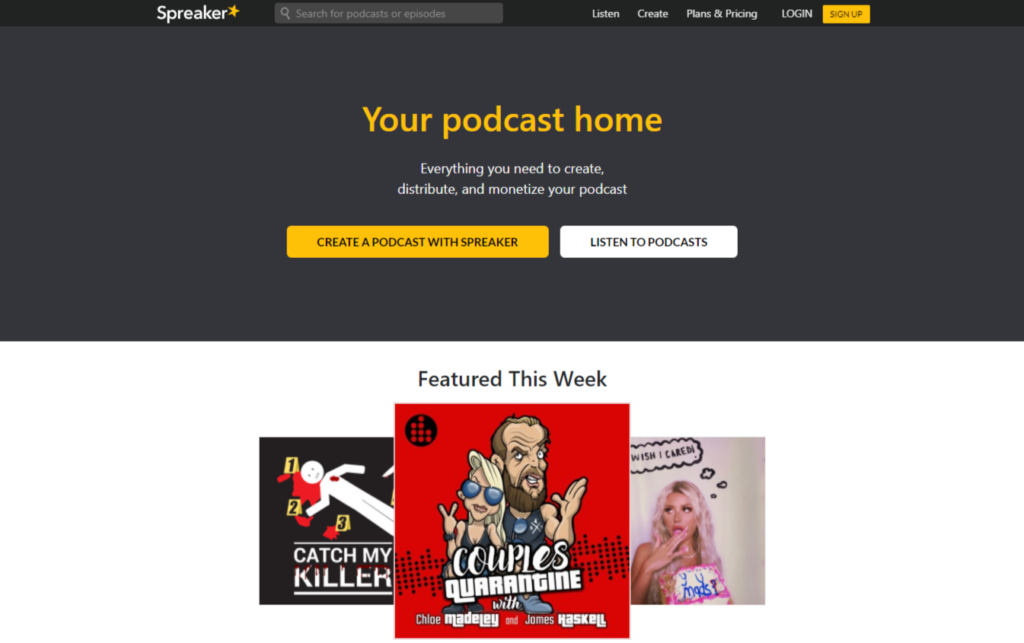
Pricing: Free to $41.25
Notable features:
- Extremely reliable server and hosting backbone
- No hidden fees
- Studio software for both desktops and mobile devices
- Unlimited bandwidth
- Publication to YouTube, Apple Podcasts, Facebook, Sonos and Twitter
The best way to think of Spreaker is that it's the unassailable tank of the industry. Their data operation is their best selling point, and they offer rock-solid reliability and uptime at a price that's well below the industry standard. Customers' free accounts are also free forever, a rare offering from the paid providers in the business.
Live recording and podcasting are also strongly encouraged on Spreaker. There are some limitations on storage, with 500 hours of audio and three hours per broadcast being the limits on the middle tier.
If you're looking to cut and edit audio, the studio tools are amazing. Unless you already have your own software, this is a superb value. Also, the studio is available for both desktops and mobile devices so you can do the job on the go or at home.
| Plan | Price | Statistics | Storage | In-App Support |
| Free Speech | $0.00 | 6 months | 10 episodes | No |
| On-Air Talent | $8.00 | 6 months | 100 hours | No |
| Broadcaster | $20.00 | 12 months | 500 hours | Yes |
| Anchorman | $50.00 | 12 months | 1,500 hours | Yes |
| Publisher | $120.00 | 24 months | Unlimited | Yes |
7. Audioboom
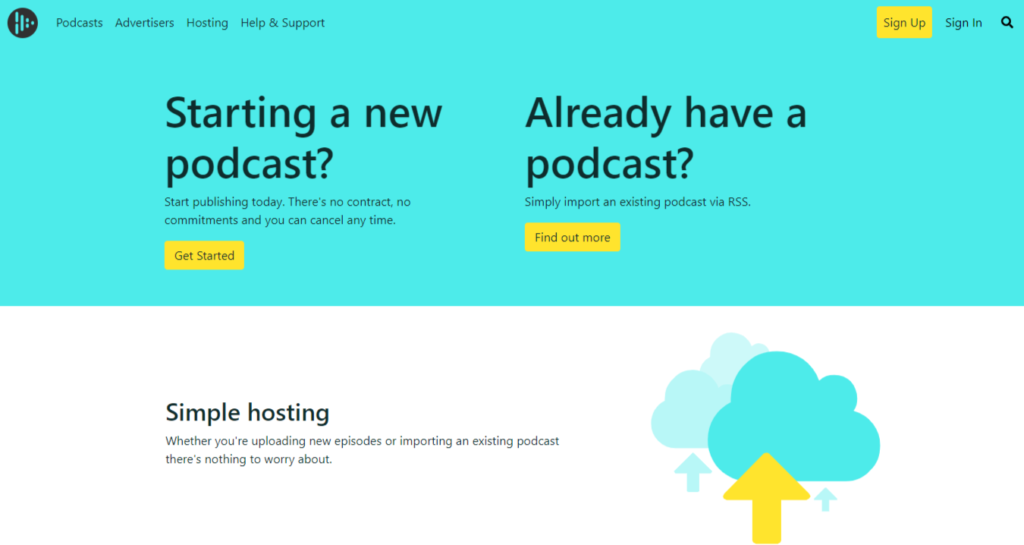
Pricing: $9.99 per month for ad-free; free with ad-supported
Notable features:
- Distribution to Apple Podcasts, Spotify, Google Podcasts, Stitcher and iHeartRadio
- Embeddable media player
Audioboom is one of the more cost-effective options for hosting, but they also offer a free and ad-supported option that represents the core of their business. In this regard, Audioboom only grudgingly accepts being a host at all.
The company's real goal is to move you toward a tier where you can make money through ads and sponsorships. In that regard, their business model is closer to YouTube than anything you'll typically see in the world of podcast hosting.
On the paid hosting tier, Audioboom offers 10,000 play per month, and that's upgradeable to 25,000. Folks on the monetized tier, conversely, get unlimited plays.
If you're looking for a quick route to a monetization strategy, you may want to give Audioboom a look. For other folks, though, the price point probably isn't competitive enough on the paid hosting side to be justifiable.
8. Castos
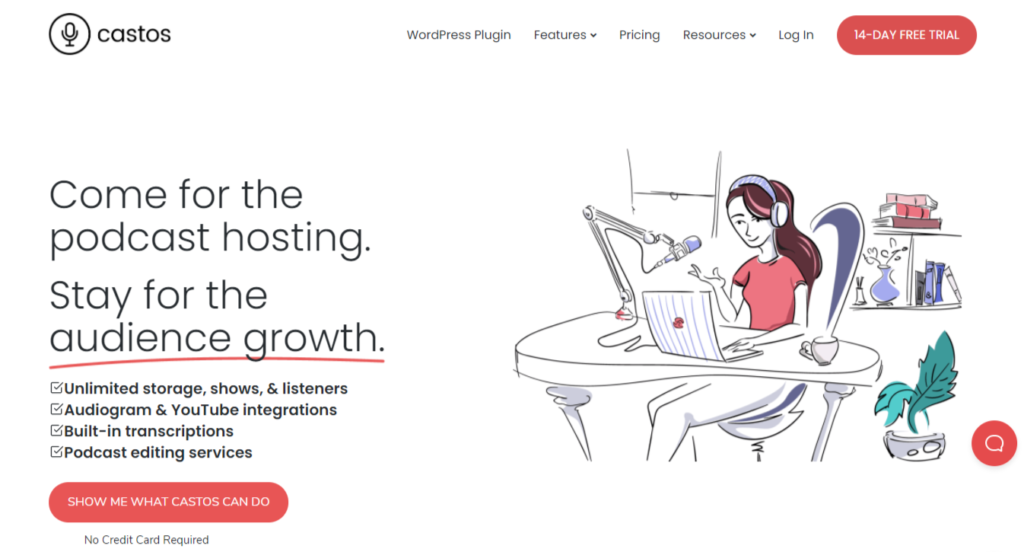
Pricing: 4190 to $990 per year, and a free, 14-day trial is also available
Notable features:
- WordPress plugin-in
- One-click content import
- Private podcasting available
- Video podcast hosting with republishing to YouTube
- Automatic transcription
Castos aims to be even more integrated with WordPress than Fusebox is. The pricing isn't the greatest, but the offer of video podcasting on the higher tiers is appealing if you want a WordPress option with that.
The automatic transcription feature is excellent. You can add the transcript to your WordPress entries, or you can download it as a PDF.
Castos isn't the greatest value on the market. If you're looking for the video or transcription features, though, it may be an intriguing choice.
| Plan | Price Monthly | Price Yearly | Private Subscribers | Downloads |
| Starter | $19.00 | $190.00 | 100 | 20,000 |
| Growth | $49.00 | $490.00 | 250 | 75,000 |
| Pro | $99.00 | $990.00 | 500 | 200,000 |
Free Podcast Hosting Options
Note that many of the companies on this list include ones that have paid options. These providers, however, tend to have offerings that are robust enough that a podcaster could do alright just by stay on the free tier.
Our list includes:
- 1. Buzzsprout
- 2. Soundcloud
- 3. Podomatic
- 4. Blubrry
You are trying to load a table of an unknown type. Probably you did not activate the addon which is required to use this table type.
1. Buzzsprout
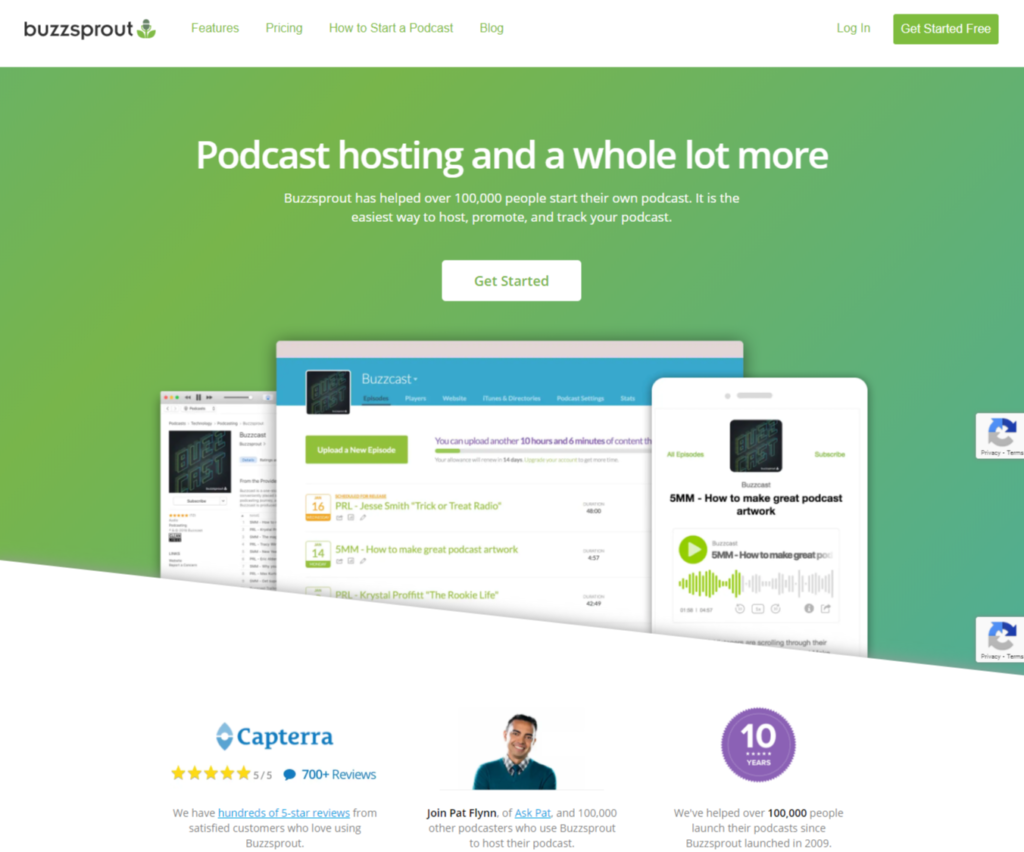
Pricing: Free to $24 per month
Notable features:
- 90 days of hosting per episode, upgradeable to indefinite hosting
- Two hours of free upload time per month, upgradeable to 12 hours per month
Buzzsprout is squarely aimed at folks who are just starting in podcasting. It has an easy-to-use interface and the offerings are enough to get all but the chattiest folks off the ground.
Notably, Buzzsprout is happy to tack on little charges for extra items. If you want 192k stereo, for example, that's an extra $6 a month. Transcription is performed at a rate of 25 cents per minute of audio.
One ugly aspect of the deal is that bandwidth can get expensive fast. You get 250 Gb per month upfront, but you can get rung up for an additional $49 per month that you exceed that total. Likewise, it's another $50 per month for every terabyte of bandwidth over one TB.
If you go with a free plan on Buzzsprout, closely watch the analytics dashboard. Also, pray you don't become an overnight success.
| Plan/Price | Upload | Episodes Hosted | Magic Mastering |
| Free | 2 hours | 90 days | Not available |
| $12.00 | 3 hours | Indefinitely | $6.00 |
| $18.00 | 6 hours | Indefinitely | $9.00 |
| $24.00 | 12 hours | Indefinitely | $12.00 |
2. Soundcloud
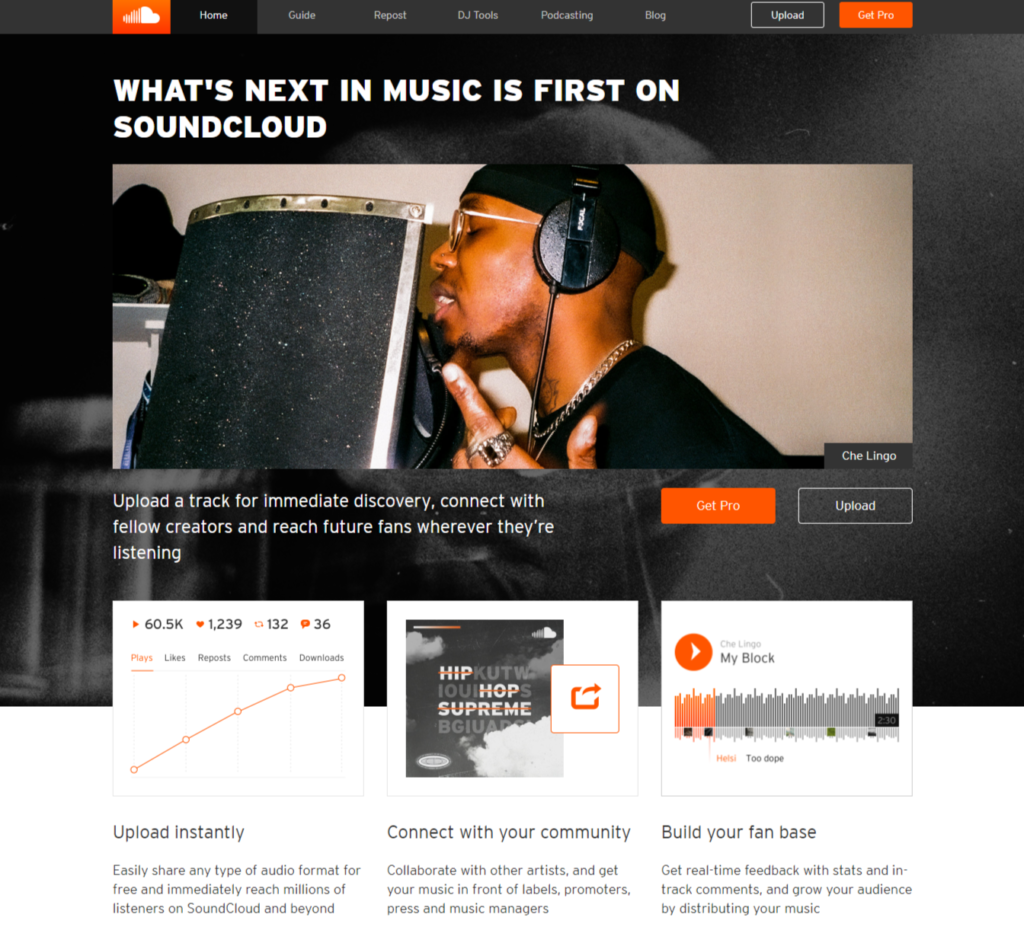
Pricing: Free to $12 per month
Notable features:
- Three hours of uploaded audio hosted per month
- Instant uploads
Arguably, Soundcloud is aimed at music acts and other entertainers in the audio sector more than podcasters. With that said, it's still a very respectable offering for a free host. You can set up podcasts, and they will be displayed as such when folks search for such content.
The company does have a very large user base, meaning Soundcloud is a wonderful way to tap into previously unreached audiences. On the downside, you will have to compete hard because there are loads of other folks on the platform.
There isn't much in the way of tools to integrate Soundcloud content with your website, though. You won't get any editing or studio tools, either, although they do have analytics.
3. Podomatic
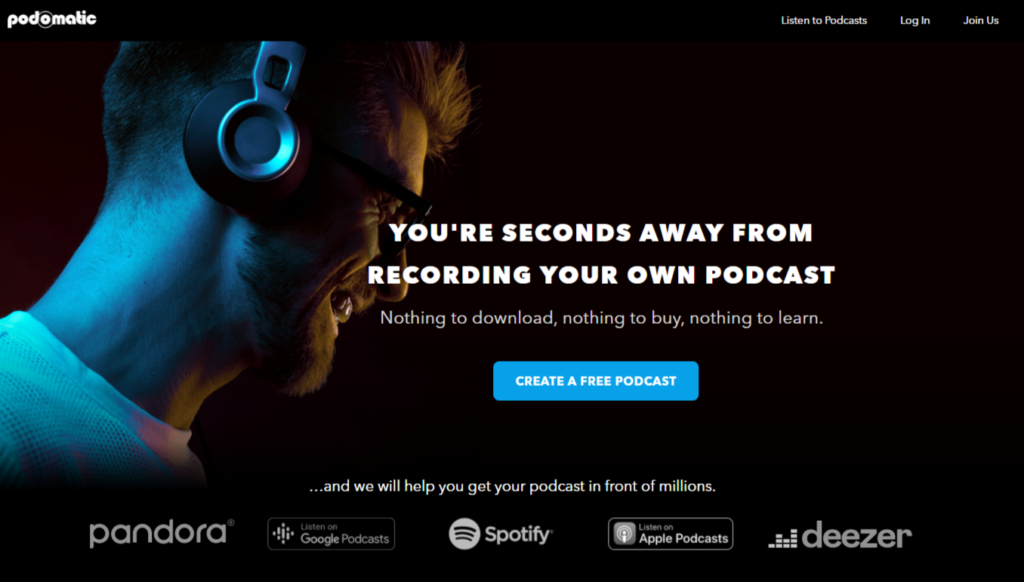
Pricing: Free to $24.99 per month
Notable features:
- Publishes content to Pandora, Google Play, Spotify and Apple Podcasts
- Free apps for Android or Apple devices, including a publishing app
- Promotional tools
- Advertising revenue options
- Crowdsourcing through Patreon and Advertisecast
Podomatic might be the most robust of the available free podcast hosting providers. They can push your content to a slew of major platforms, and they will even cut you in on the revenue. You also can set up a Patreon account so fans can pay to keep your podcast flying. It may be one of the best ways to reach an audience.
On the downside, the site isn't always the speediest in the industry. You will, however, get unmetered bandwidth.
| Plan | Price | Bandwidth | Storage |
| Basic | Free | 15GB | 500MB |
| Pro | $2.49 | 100GB | 2GB |
| Pro Plus | $8.32 | 200GB | 3GB |
| Pro Platinum | $20.82 | 500GB | 5GB |
4. Blubrry
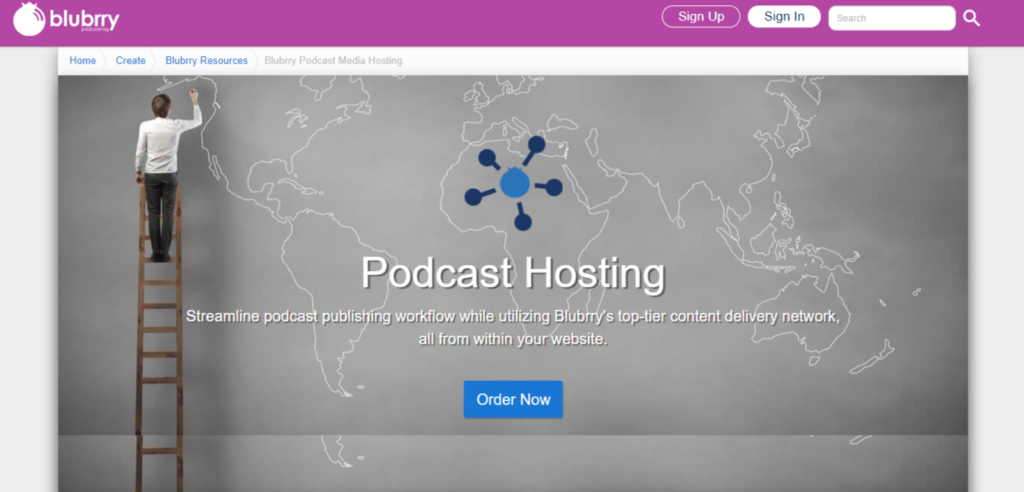
Pricing: Free to $80 per month
Notable features:
- Free WordPress plug-in integration
- SEO and website utilities
- MP3 tagging
Yes, impressively enough, there is a free provider that is focused on WordPress integration. Blubrry, however, has a business model based on paying for storage space. By the time you get up to 100 Mb of files, you'll need to upgrade to the $12 plan. Unlimited hosting is offered at higher tiers.
There are better options on the market. If you insist on using a free provider and want to get a WordPress plug-in, though, Blubrry will get the job done.
| Plan | Price | Storage | Additional Themes | DNS Management |
| Standard | $10.00 | 125MB | Not available | Not available |
| Advanced | $17.00 | 400MB | Available | Available |
FAQS
How Much Difference Is There Between Free and Paid?
In terms of performance, you're not going to notice any difference between streaming on a free or paid platform. For most podcasters, the big difference is the business model. In particular, bandwidth metering is the name of the game in podcast hosting.
Once you're sure your podcast is going to consistently gain customers, it's probably best to move to a paid plan that includes unmetered bandwidth and unlimited storage. A free plan, though, will get the job done while you're still in the proof-of-concept phase. Use the analytics to dial in your content to what resonates with the audience.
Why Are Podcast Directories Bad?
They're not, but we previously mentioned the distinction because hosting a podcast just isn't the same thing as listing it in a directory. A directory, such as Spotify, has to detect a hosted file before it can download it and make it available to listeners.
How Do You Get Onto the Big Platforms?
All of the big platforms, such as iTunes and Google Play, have application processes in place. You should line these accounts up the moment you start planning a podcast. As you produce your first podcast and set up hosting, those approvals should come through as long as there's nothing potentially objectionable about your proposed content. That'll ensure you're ready to publish content to your host and then onto the bigger platforms.
What Do You Need to Do a Podcast Besides Hosting?
Most folks in the podcasting world use a basic setup with a quiet room, microphone and computer. If at all possible, try to find a space that doesn't cause a lot of reverb, echoes or audio artifacts. Manufacturers like Neewer produce very cost-effective microphones that are available on Amazon and eBay, and you can get 100% free audio editing software for your computer from Audacity.
What's a Good Reason for Starting a Podcast?
Starting a podcast can be as easy as flipping on the microphone, or as complicated as getting executive approval and budget for a full season of high-end production. But you have to start with your reason.
What's the vision? The mission? The purpose?
Like any business or life venture, you want to be able to point to the top of the mountain and say you're going to climb that peak. You may not know how to get there entirely, but you know the general direction and you know the next few steps.
Wishpond gives a few good reasons, namely: for distribution, to meet your audience where they are, and because podcast listeners are particularly engaged.
How Do You Build an Audience?
It cannot be emphasized strongly enough how important it is to follow the analytics. Almost everybody, even free companies, offers analytics with their podcast hosting options.
Learn how to read the analytics, and develop a commitment to following the data to its logical conclusion. If a particular type of content seems to drive audience interest and social media sharing, come back to that well. By maintain a data-centric attitude, you can develop a podcast that will connect with new audience members and encourage sharing. In other words, you'll have a growth model.
Last Updated on September 6, 2022 by Adrian Grant

